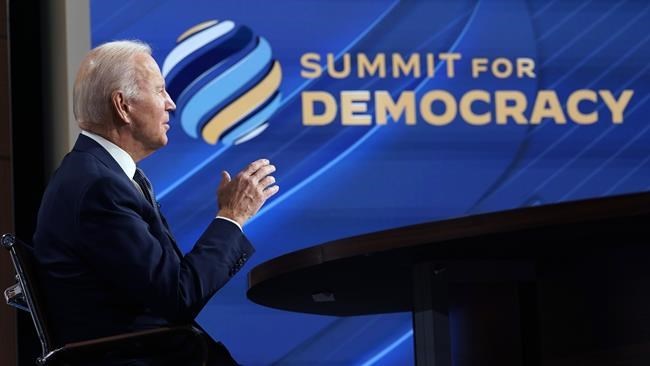WASHINGTON — The free world stands at a historic "inflection point," its values and ideals under existential threat both at home and abroad, President Joe Biden said Thursday as he tried to rally world leaders and citizens alike to the cause of government by, of and for the people.
Biden's call to arms came at the outset of his two-day Summit for Democracy, a Zoom-based gathering of government officials, business leaders, union heads and civil society advocates from more than 100 countries around the world.
"This is the defining challenge of our time," the president said, Secretary of State Antony Blinken sitting alongside, to a pair of massive screens filled with the checkerboard images of more than 80 world leaders, including Prime Minister Justin Trudeau.
"Yes, democracy is hard — we all know that. It works best with consensus and co-operation. When people and parties that might have opposing views sit down and find ways to work together, things began to work. But it's the best way to unleash human potential and defend human dignity and solve big problems."
Lofty rhetoric notwithstanding — nothing short of the founding principles of the Declaration of Independence are hanging in the balance, Biden suggested — the summit has been greeted with muted enthusiasm at best, and at worst charges that it's not practising what it preaches.
Of the 111 countries invited to take part, 37 of them "severely restrict" the ability of people to freely organize, participate in and communicate with the political and social structures around them, according to the international civil society alliance known as Civicus.
Seven participating nations were downgraded in the group's latest annual freedom index, while only five per cent of the population represented at the summit live in countries — Canada among them — where civic and democratic rights are fully protected.
Civicus ranks the U.S., on the other hand, as "obstructed," thanks in large part to the widening limits on voting rights in southern states, persistent efforts to limit access to abortion, the treatment of protesters and ongoing social tensions related to COVID-19.
Stand Up America, a progressive grassroots group founded in the wake of Donald Trump's election win in 2016, reminded supporters Thursday that the Biden administration has yet to pass long-promised bills to protect voting rights in the U.S.
"We're now a year into President Biden's term and he has yet to deliver on voting rights and protecting our democracy," the missive read. "A year's worth of press conferences, speeches and Zoom calls don't add up to much when our voting rights are being eroded."
Trudeau urged leaders during the first plenary session of the summit to "work together," according to a release from the Prime Minister's Office — the sessions were not open to the media.
"We must continue to work to safeguard our institutions, counter the rise of authoritarianism, and protect and expand democratic rights and freedoms worldwide in order to create a more secure, stable, and prosperous world for future generations."
He announced $5 million in human rights funding for the United Nations and $3 million for State Department programs for LGBTQ and religious rights. He also cited Canada's spearheading an international declaration against arbitrary detention, a product of China's three-year imprisonment of Canadian citizens Michael Spavor and Michael Kovrig starting in 2018.
For his part, Biden promised US$424 million for a global democratic renewal strategy that includes bolstering media freedom, fighting corruption, enlisting technology and defending free and fair elections.
The initiative includes US$30 million to enhance independent media growth in "resource-poor and fragile" locations, as well as a US$9-million "defamation defence fund" to help protect investigative journalism around the world.
There's also more than US$75 million for a multi-pronged offensive aimed at weeding out corruption and money laundering, US$155 million to support democratic reform globally, $85 million to foster free elections and US$28 million to explore and develop ways of leveraging technology to foster democratic ideals.
The summit is unfolding before a real-world backdrop of autocracy on the march, with Russia and China — two of the gathering's most glaring absences — flexing their military muscles at neighbouring Ukraine and Taiwan.
"They seek to advance their own power, export and expand their influence around the world and justify the repressive policies and practices as a more efficient way to address today's challenges," Biden said, without mentioning names.
"That's how it's sold by voices that seek to fan the flames of social division and political polarization."
Vice-President Kamala Harris closed the day's events with the only direct public acknowledgment of the elephant in the Zoom room: the assault on the U.S. Capitol last January by Trump supporters hoping to prevent the certification of Biden's election victory.
"Here in the United States, we know that our democracy is not immune from threats. Jan. 6 looms large in our collective conscience," Harris said.
She described state election-reform laws as "an intentional effort to exclude Americans from participating in our democracy," vowed to redouble efforts to pass legislation protecting voting rights and urged Congress to get on board.
Harris also made the point that the rights of Indigenous Peoples, members of the LGBTQ community, people of colour and people with disabilities are intrinsic to a healthy democracy. And she singled out the rights of women as especially important.
"I strongly believe the status of women is the status of democracy," she said. "The exclusion of women in decision-making is a marker of a flawed democracy, and the full participation of women strengthens democracy."
This report by The Canadian Press was first published Dec. 9, 2021.
James McCarten, The Canadian Press



